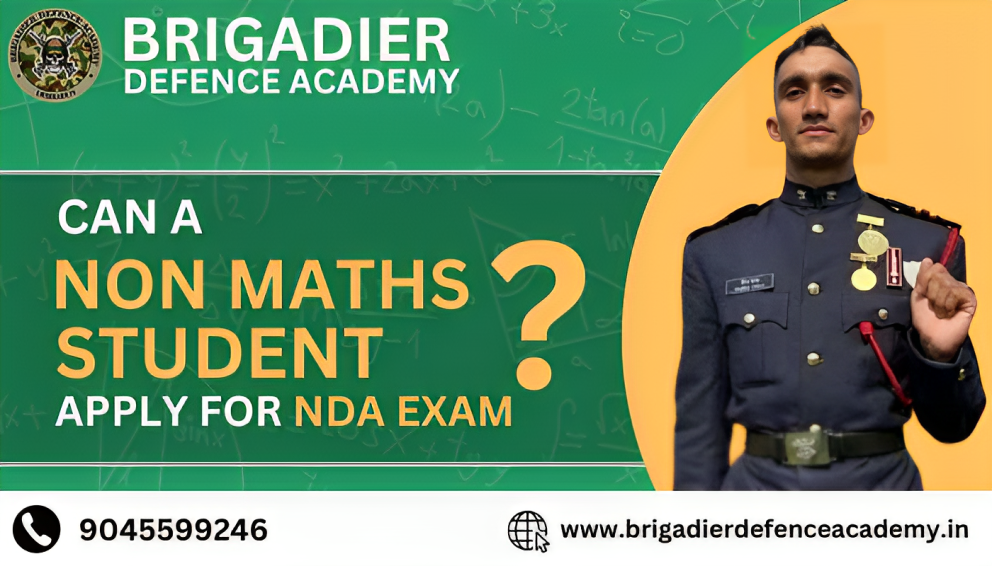Introduction:
A distinguished organization that prepares young people to join the Indian Armed Forces as officers is the National Defence Academy (NDA). There is a widespread misperception that only students with a solid background in mathematics are eligible to apply, despite the fact that the NDA exam is notorious for its demanding selection procedure. We shall dispel the misconceptions around this idea and investigate whether a non-math student can truly want to join the NDA in this blog.
Understanding the NDA Exam:
It’s important to comprehend the format of the test before discussing whether or not non-math students can apply for the NDA exam. The NDA exam consists of a written exam and a drawn-out interview process. The General Ability Test (GAT) and Mathematics are the two papers that make up the written exam. Many people believe that applicants shouldn’t even consider applying if they aren’t good in maths because there is a mathematics paper.
Debunking the Math Myth:
The NDA exam does not require candidates to be math whizzes, despite what the public believes. Even though it is included in the written exam, mathematics is only one aspect of the overall assessment. The purpose of the mathematics exam is to evaluate a candidate’s foundational knowledge of ideas covered in math up to the tenth grade. It covers subjects including arithmetic, geometry, algebra, and trigonometry.
This may initially seem daunting to students who do not study mathematics. However, applicants from any academic background can do well on the mathematics paper if they prepare carefully and have a firm grasp of the fundamentals. Creating a methodical study schedule and getting advice from seasoned mentors or coaching organizations are crucial.
Importance of GAT:
The second paper in the NDA written exam is the General Ability Test (GAT), which is very important to the evaluation as a whole. English, General Knowledge, Physics, Chemistry, General Science, Geography, and Current Affairs are some of the sections that make up the GAT. The GAT gives non-math students a chance to highlight their strengths outside of arithmetic.
Being proficient in English is especially important since military officials need to be able to communicate effectively. Candidates are assessed by GAT on their general awareness, understanding, and verbal and nonverbal reasoning. Students who are not math majors might use these areas of competence to make up for any difficulties they may have with the math paper.
Preparation Strategies for Non-Math Students:
1. Understand the Syllabus:
Non-math students should thoroughly understand the mathematics syllabus and focus on the fundamental concepts. This includes topics like basic arithmetic, algebraic expressions, geometry, and trigonometry.
2. Develop a Study Plan:
Creating a structured study plan is crucial for effective preparation. Allocate dedicated time for each subject, giving extra attention to mathematics if it’s not your forte. Break down the syllabus into manageable sections and cover them systematically.
3. Seek Expert Guidance:
Enrolling in a coaching institute or seeking guidance from experienced mentors can be immensely helpful. Trained professionals can provide valuable insights, tips, and shortcuts for solving mathematical problems efficiently.
4. Practice Regularly:
Practice is key when it comes to mastering mathematics. Solve a variety of problems from previous years’ question papers and sample papers to familiarize yourself with the exam pattern and improve your problem-solving skills.
5. Focus on GAT Subjects:
Since GAT carries significant weight in the overall assessment, non-math students should focus on excelling in subjects like English, General Knowledge, and Current Affairs. Stay updated on national and international events to perform well in the General Knowledge section.
Success Stories of Non-Math Students:
To further dispel the myth that only math students can succeed in the NDA exam, it’s essential to highlight success stories of candidates from non-math backgrounds. Numerous officers in the Indian Armed Forces have proven that a strong foundation in mathematics is not the sole determinant of success in the NDA exam. These individuals excelled in the GAT sections and demonstrated leadership qualities during the interview process.
Conclusion:
To sum up, it is a myth that has to be debunked that only those studying math can apply for the NDA exam. Even though math is covered in the written exam, non-math students can nonetheless succeed without it. People from a variety of academic backgrounds can succeed in the NDA selection process with commitment, a well-thought-out study strategy, and a concentration on the GAT portions.
Candidates with a broad range of abilities, such as communication, leadership, and general awareness, are sought for by the NDA exam. Students who are not math majors should rise to the occasion, make the most of their advantages, and go into the test with assurance. Aspiring candidates can clear the path to a happy and successful career in the Indian Armed Forces by dispelling the myth that math proficiency is required.







